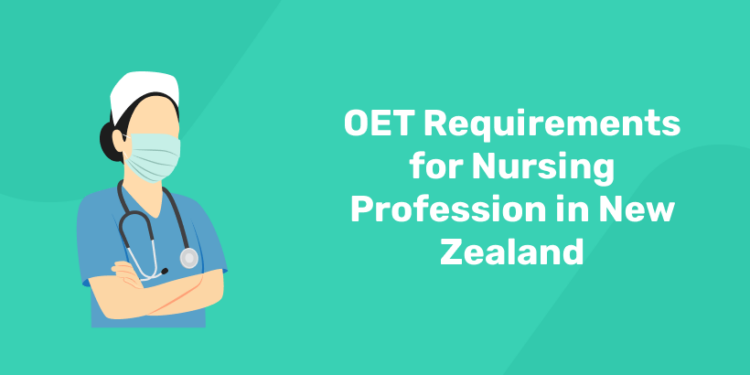Table of Contents
The Occupational English Test (OET) is a specialized language proficiency exam designed for healthcare professionals, including nurses, aspiring to work in New Zealand. It evaluates the English language skills required to effectively communicate and perform in healthcare settings. In this Guide, we will discuss OET requirements for the Nursing Profession in New Zealand.
The OET assesses four key language domains: listening, reading, writing, and speaking, all in a healthcare context. To meet the OET requirements for nursing in New Zealand, applicants typically need to achieve a minimum grade of B in all four components. The OET scores are usually valid for two years, ensuring that candidates’ language skills remain up-to-date. This tailored assessment ensures that nursing professionals have the necessary language competence to deliver quality healthcare in English-speaking environments.
Check out these videos by Entri on OET in Malayalam!
What is OET?
The Occupational English Test (OET) is an international English language proficiency examination specifically designed for healthcare professionals. It assesses the English language skills of candidates who are planning to work or study in healthcare-related roles, such as doctors, nurses, dentists, pharmacists, and other allied health professionals. OET evaluates the language abilities required for effective communication and understanding in real healthcare scenarios, ensuring that candidates can function confidently and safely in English-speaking healthcare settings.
Unlike general English tests, OET focuses on healthcare-specific language tasks to make the assessment relevant and practical for professionals in the medical field. The test consists of four components: Listening, Reading, Writing, and Speaking, all related to healthcare contexts. Each component measures different language skills and is designed to replicate real-life healthcare communication scenarios, such as patient consultations, medical articles, healthcare reports, and role-plays with patients or colleagues.
Get your Desired PTE Scores in Weeks! Get Free Demo!
OET is recognized and accepted by various healthcare regulatory bodies, universities, and employers in several English-speaking countries, including Australia, New Zealand, the United Kingdom, Ireland, and Singapore, among others. It is widely regarded as a reliable and relevant English language test for healthcare professionals aiming to pursue their careers or studies in English-speaking healthcare environments.
OET Reading Sample Papers with Answer Key
Click below for the complete question paper with answer keys
| Sample Papers | Answer Keys |
Click below for more sample papers
| Reading Sample Papers |
OET Requirements for Nursing Profession in New Zealand: How to work in New Zealand?
1: What is the primary purpose of a patient’s discharge summary?
To work as a nurse in New Zealand, you’ll need to go through a few steps to ensure you meet the necessary requirements and obtain the required approvals. Here’s a general outline of the process:
Nursing Qualifications:
Ensure you have the necessary nursing qualifications from an accredited institution in your home country. New Zealand recognizes various international nursing qualifications, but it’s essential to check if your qualification is accepted by the New Zealand Nursing Council (NZNC).
English Language Proficiency:
Demonstrate your English language proficiency. New Zealand accepts various English language tests, including IELTS and the Occupational English Test (OET). Check the NZNC website for the specific English language requirements for nurses.
Registration with NZNC:
Apply for registration with the New Zealand Nursing Council. You will need to provide proof of your nursing qualifications, transcripts, and other relevant documents. The NZNC will assess your qualifications and determine if you meet their requirements.
Visa and Work Permit:
If your application for registration is successful, you will need to apply for a work visa or permit to legally work in New Zealand. Check the New Zealand Immigration website for information on work visas and permits.
Police Clearance and Health Checks:
You may be required to undergo a police clearance certificate and a health check as part of the visa application process.
Job Search:
Once you have obtained your nursing registration and work permit, you can start looking for nursing job opportunities in New Zealand. Various websites and job portals advertise nursing vacancies.
Settle in New Zealand:
Once you secure a job and move to New Zealand, familiarize yourself with the healthcare system, local regulations. Also learn about any specific requirements for practicing as a nurse in the country.
Crack OET & Boost Your Healthcare Career!
OET Coaching by Entri App: Get expert guidance, practice with real exam scenarios, and achieve your target score to advance your healthcare career.
Join Now!ace your oet exams with desired band scores ! enroll now !
OET requirements for Nursing Profession in New Zealand
OET is one of the accepted English language proficiency tests for healthcare professionals, including nurses, applying for registration and migration purposes in New Zealand. Please note that requirements and policies may change over time, so it is essential to check the official New Zealand Nursing Council website or relevant authorities for the most up-to-date information.
The OET requirements for nursing professionals in New Zealand are as follows:
- Overall Grade: Applicants were typically required to achieve a minimum grade of B in all four components of the OET (Listening, Reading, Writing, and Speaking).
- Validity Period:The OET results were usually valid for two years from the date of issue. Applicants were required to submit valid OET scores within this time frame.
- Minimum Component Scores: In some cases, there might have been minimum component score requirements, meaning that each of the four components had to meet a certain grade level, usually at least B.
OET requirements may vary depending on the type of registration or visa you are applying for. It also depends on the specific immigration or healthcare authority processing your application. Always refer to the official sources for the most current and accurate information. Additionally, it is essential to consider that language requirements can change. So, staying updated is vital to ensure compliance with the latest regulations.
Get your Desired PTE Scores in Weeks! Get Free Demo!
How OET Grading is done?
The Occupational English Test (OET) uses a grading system to assess the English language proficiency of healthcare professionals. The grading system consists of alphabetic grades from A to E, with A being the highest and E the lowest level of performance. Each of the four components of the OET (Listening, Reading, Writing, and Speaking) is graded separately. A candidate’s overall performance is determined by the grades achieved in all four components.
The grading scale for OET is as follows:
- A: Very high level of performance. Indicates that the candidate can communicate effectively and with accuracy in all relevant aspects of the language.
- B: High level of performance. Shows that the candidate can use English proficiently and with effectiveness in most situations.
- C: Satisfactory level of performance. Indicates that the candidate can use English adequately in familiar contexts but may face difficulties in unfamiliar situations.
- D: Limited level of performance. Shows that the candidate has a basic command of English but has difficulties in using the language.
- E: Very limited level of performance. Indicates that the candidate’s English language skills are not adequate for effective communication in a healthcare environment.
To meet the OET requirements for most healthcare regulatory bodies and institutions, candidates typically need to achieve a minimum grade of B in all four components of the test.
Why work as Nurse in New Zealand?
Working as a nurse in New Zealand offers several compelling reasons that attract healthcare professionals from around the world:
Quality of Life:
New Zealand consistently ranks high in global surveys for its quality of life. The country’s stunning natural beauty, clean environment, and outdoor recreational opportunities contribute to a healthy work-life balance.
Public Healthcare System:
New Zealand has a well-structured public healthcare system that provides healthcare services to residents and eligible visa holders. Nurses working in this system have access to resources and support to deliver quality patient care.
Career Opportunities:
The demand for healthcare professionals, including nurses, remains steady in New Zealand. There are opportunities for career advancement and specialization in various nursing fields.
Competitive Salaries:
Nurses in New Zealand receive competitive salaries and benefits, making it an attractive destination for those seeking financial stability and job security.
Workplace Culture:
New Zealand is known for its friendly and inclusive workplace culture. Nurses often experience a supportive and collaborative environment that enhances job satisfaction.
International Experience:
Working as a nurse in New Zealand allows healthcare professionals to gain valuable international experience, which can boost their professional development and enhance their resumes.
Cultural Diversity:
New Zealand is a multicultural country, and healthcare professionals have the opportunity to work with patients from diverse backgrounds, enriching their understanding of different cultures and healthcare practices.
Safe and Stable Environment:
New Zealand is considered one of the safest countries globally, providing a secure and stable environment for residents and expatriates.
Opportunities for Continuing Education:
New Zealand offers various opportunities for continuing education and professional development, enabling nurses to stay updated with the latest healthcare practices and advancements.
Migration Pathway:
For nurses who aspire to become permanent residents or citizens of New Zealand, working as a healthcare professional can provide a pathway to long-term residency.
Crack OET & Boost Your Healthcare Career!
OET Coaching by Entri App: Get expert guidance, practice with real exam scenarios, and achieve your target score to advance your healthcare career.
Join Now!crack oet exams wih entri’s onine coaching ! join now !
Conclusion:
In conclusion, OET requirements for Nursing Profession in New Zealand was discussed. Nursing professionals seeking registration and employment in New Zealand are typically required to meet the OET requirements. OET assesses the English language proficiency of healthcare professionals, ensuring effective communication in healthcare settings.
o be eligible for nursing registration in New Zealand, candidates usually need to achieve a minimum grade of B in all four components of the OET (Listening, Reading, Writing, and Speaking). Adhering to these requirements is essential for nurses to embark on a rewarding and fulfilling career in New Zealand’s healthcare system. Check out our Online OET Coaching, where we have already trained and helped students land their nursing jobs in their favorite countries.
OET requirements for Nursing Profession in New Zealand: FAQs?
1. What is OET, and why is it required for nursing professionals in New Zealand?
Ans. OET (Occupational English Test) is an English language proficiency examination designed specifically for healthcare professionals, including nurses. New Zealand requires nursing professionals to demonstrate their English language competency to ensure effective communication and patient care in English-speaking healthcare environments. OET assesses the language skills necessary for healthcare professionals to perform their roles with confidence and accuracy.
2. What OET score do I need for nursing registration in New Zealand?
Ans. The specific OET score requirements may vary depending on the nursing regulatory authority and the type of nursing registration you are applying for. In most cases, nursing professionals are required to achieve a minimum grade of B in all four components (Listening, Reading, Writing, and Speaking) of the OET.
3. Can I use other English language tests, like IELTS, instead of OET for nursing registration in New Zealand?
Ans. Yes, some nursing regulatory bodies in New Zealand may accept other English language tests, such as IELTS (International English Language Testing System), as an alternative to OET. However, it is crucial to check with the specific nursing authority or employer to determine which tests they accept and what scores are required.
4. How long are OET scores valid for nursing registration in New Zealand?
Ans. OET scores are typically valid for two years from the date of issue. Nursing professionals must ensure that their OET scores are within this timeframe when applying for nursing registration in New Zealand.
5. Can I take the OET test in my home country, or do I need to travel to New Zealand?
Ans. OET is an international test, and you can take it in various locations worldwide. You do not need to travel to New Zealand to take the OET test. Check the official OET website for information about test centers and available dates in your country.
6. Are there any exemptions from the OET requirement for nursing professionals in New Zealand?
Ans. Exemptions from the OET requirement may be granted in specific cases, such as if English is your native language or if you have completed your nursing education in a country where English is the primary language. However, the granting of exemptions varies based on the nursing regulatory authority’s policies and requirements.
7. Can I retake specific OET components if I don’t achieve the required grade in one of them?
Ans. Yes, candidates can retake specific components of the OET if they do not achieve the required grade in one or more sections. However, it’s essential to check the OET policies regarding retakes and how they may impact the overall validity of your scores.
8. Can I use OET scores for immigration purposes as well as nursing registration?
Ans. Yes, OET scores can be used for both nursing registration and immigration purposes in New Zealand. Meeting the English language proficiency requirements through OET is often necessary for obtaining a work visa or permit to work as a nurse in New Zealand.
OET Writing Samples for Nurses – Download PDF Links
Click below for sample papers:
| Sample Papers |
OET Writing Sample Papers with Answer Keys
| Writing Sample Papers | Answer Keys |
|
|
|
| Related Links | |
| OET Speaking Topics | OET Writing – Complete Guide |
| OET Speaking – Complete Guide | OET Reading Samples |
| OET vs IELTS | OET Reading Tips |













